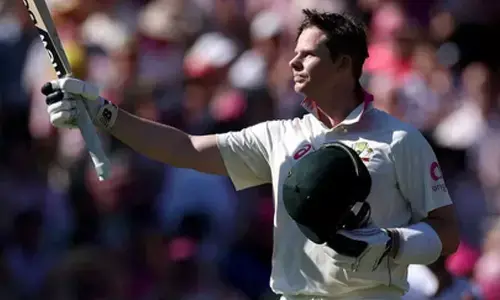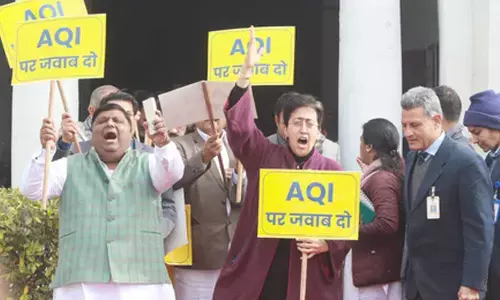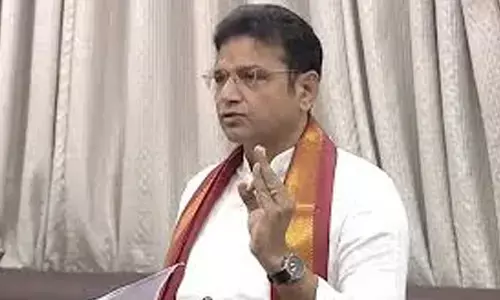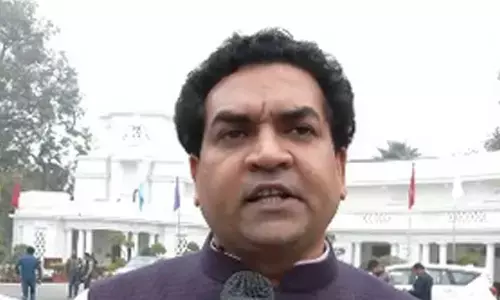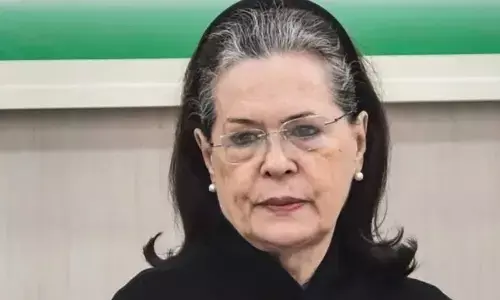'Book in Hindi will help counter 'WhatsApp varsity' on India's PMs'
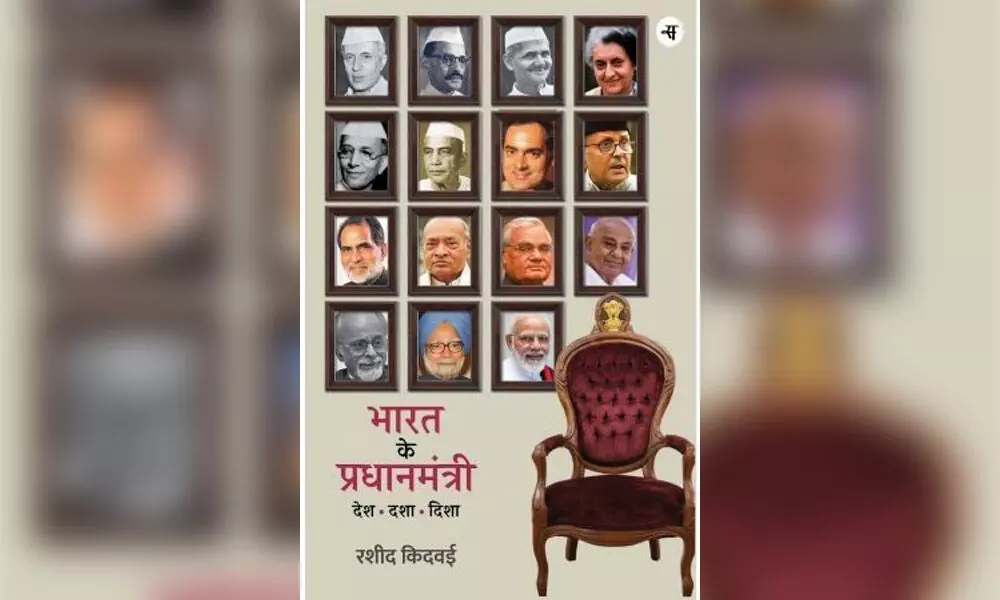
‘Book in Hindi will help counter ‘WhatsApp varsity’ on India’s PMs’
Rasheed Kidwai, a political commentator, author and journalist of three decades standing, generally writes in English but chose Hindi for his book on Indian Prime Ministers as he found it the ideal medium to not only to counter what the "WhatsApp University" has been purveying on social media but also to serve as a handbook for students of contemporary Indian politics
Rasheed Kidwai, a political commentator, author and journalist of three decades standing, generally writes in English but chose Hindi for his book on Indian Prime Ministers as he found it the ideal medium to not only to counter what the "WhatsApp University" has been purveying on social media but also to serve as a handbook for students of contemporary Indian politics.
"I felt it was best to counter the 'WhatsApp University' if the book was written in Hindi. Moreover, the Observer Research Foundation Hindi website had earlier asked me to run a short series on the former Prime Ministers," Kidwai told IANS in an interview of "Bharat Ke Pradhan Mantri" (Rajkamal Prakashan).
"I was also a political commentator when the 'Pradhan Mantri' series was run on (a) TV news channel. It had some glaring holes. My work is far from being perfect but credible dates, events and characters have been presented," he added.
As a political journalist, he said he had been thinking about doing a book that will work as a handbook for students of contemporary Indian politics, those aspiring for civil services, dispassionate observers, and the younger generation -- "a book that will give the contributions, follies, important events in the life of each of the 14 prime ministers in a capsule form. I think there have been many misgivings, often politically motivated which are spread about former Prime Ministers on social media platforms," Kidwai elaborated.
Considerable research went into the book. "A lot of research had to be done. I have seen Prime Ministers from the Rajiv Gandhi era till Narendra Modi as a journalist and as a youngster, Indira Gandhi, Morarji Desai, Charan Singh, Chandrashekhar and V P Singh.
"Having written extensively on the Congress, it helped me get a lot of perspective about Jawaharlal Nehru, Lal Bahadur Shastri, Indira Gandhi, Rajiv Gandhi, P.V. Narasimha Rao. Atal Bihari Vajpayee was a towering leader even in the opposition. (The writing of) my books, "24, Akbar Road", "Ballot, Neta Abhineta - Bollywood Star Power in Indian Politics" and the "House of Scindias" had given me lot of insight and some anecdotes," Kidwai explained.
While political leaders are "often physically distant and never available for controlled laboratory-based experiments interviewing them, travelling with them, covering their public meetings, press conferences is of great help", he said, adding: "Often, Prime Ministers indicate their socio-political, economic, and international policy decisions as per their upbringing, process of socialization etc."
How would he assess the legacy of India's Prime Ministers? "I think each prime minister had a legacy of their own. They were all sincere, committed to the cause of the unity and integrity of the country. They were men and women in flesh and blood so they were prone to mistakes and open to criticism," he said.
"Jawaharlal Nehru was a visionary, architect of modern India. He was an internationalist who had a plan for the country's economy, industrialization. Nehru understood the importance of cinema. Politics and cinema in the Indian context have had intrinsic relations. Nehru's impact is evident in the work of many, from Dadasaheb Phalke to Aamir Khan. The films of V Shantaram, Mehboob Khan, Raj Kapoor, and, more recently, Vidhu Vinod Chopra, among others, dealt with the core themes of such as love and sacrifice, Hindu-Muslim unity, the rural-urban divide, rejection of crass commercialism, women's emancipation, and fear of moral decay," Kidwai said.
Nehru's successor Lal Bahadur Shastri "was a man of great integrity and character. On his clarion call, millions stopped having a meal a day or opted for weekly fast to save food grains and other resources. Shastri's call for 1965 war funds saw huge donations of gold by housewives. Shastri knew and understood the significance of soldiers and farmers and gave the 'Jai Jawan Jai Kisan' slogan which continues to be one of the most popular in the country even today", Kidwai said.
Indira Gandhi, he said, requires a full volume. "She defied many odds to emerge as the greatest Prime Minister India had. However, some of her policies made the Congress suffer from a steady breakdown in ideological clarity for decades, evident in its confusion over secularism, sanctioning political defections, appeasement politics etc."
Morarji Desai had made serious and sincere peace overtures toward Pakistan, Kidwai said. "It is said that Desai had planned to settle Kashmir dispute with Pakistan and had reached to an agreement with General Zia Ul Haq. Zia had intended to announce the agreement during a planned visit to India, but the Janata government fell and with it was lost a precious opportunity to reach a durable agreement with Islamabad," Kidwai said, adding that on the foreign policy front, Desai sought to revise the stance toward the Soviet Union and proclaimed a policy of "genuine Non-Alignment".
Charan Singh "was a great champion of the cause of the farmers. He was a Gandhian too. Had he served longer, some of the agrarian problems we are facing today would have been resolved by now," Kidwai maintained. Rajiv Gandhi was a true modernist and reformer.
"I think political inexperience was his greatest enemy. Perhaps that is the reason why Rahul Gandhi is still reluctant to don the mantle of leadership or become a prime ministerial aspirant. His government's decisions on Ayodhya and the Shah Bano judgment have had a lasting impact on the country's politics. Political naivety overshadowed many of his positive interventions, such as the priority he accorded to technology, education, infrastructure development and economic reforms," Kidwai said.
On Manmohan Singh, Kidwai said both he and Sonia Gandhi "were great believers in tokenism". "Be it the selection of a new President, the Home Minister, the Speaker, the heads of various boards and commissions, and other key appointments, the UPA leadership looked for token empowerment on gender, caste, and community lines. It did not work at all but rather promoted mediocrity at the expense of merit," Kidwai maintained.
Narendra Modi "has changed all rules of the game in politics. In Indian politics, Modi has become an integral, rather a necessary part of the system. Sometimes I wonder if there are many options before the voters as those who have got identified with him and Hindutva's ideology cannot take a U-turn. So it is working for him and the BJP", Kidwai said. In sum, this is a book that needs to be widely read and also translated into English and other Indian languages.









